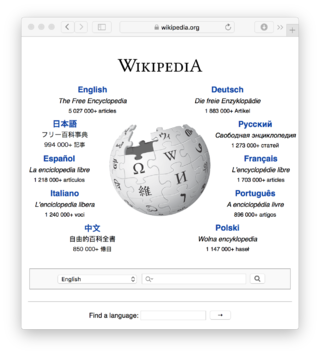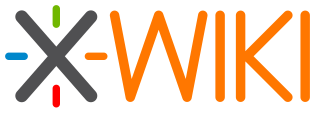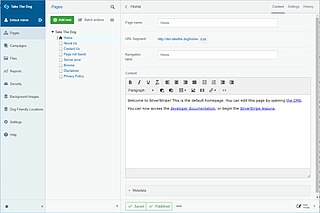An integrated development environment (IDE) is a software application that provides comprehensive facilities for software development. An IDE normally consists of at least a source-code editor, build automation tools, and a debugger. Some IDEs, such as IntelliJ IDEA, Eclipse and Lazarus contain the necessary compiler, interpreter or both; others, such as SharpDevelop and NetBeans, do not.

Wiki software is collaborative software that runs a wiki, which allows the users to create and collaboratively edit pages or entries via a web browser. A wiki system is usually a web application that runs on one or more web servers. The content, including previous revisions, is usually stored in either a file system or a database. Wikis are a type of web content management system, and the most commonly supported off-the-shelf software that web hosting facilities offer.
HTML-Kit is a proprietary HTML editor for Microsoft Windows made by chami.com. The application is a full-featured HTML editor designed to edit, format, validate, preview and publish web pages in HTML, XHTML and XML -languages.

MediaWiki is a free and open-source wiki software originally developed by Magnus Manske for use on Wikipedia on January 25, 2002, and further improved by Lee Daniel Crocker, after which it has been coordinated by the Wikimedia Foundation. It powers several wiki hosting websites across the Internet, as well as most websites hosted by the Foundation including Wikipedia, Wiktionary, Wikimedia Commons, Wikiquote, Meta-Wiki and Wikidata, which define a large part of the set requirements for the software. MediaWiki is written in the PHP programming language and stores all text content into a database. The software is optimized to efficiently handle large projects, which can have terabytes of content and hundreds of thousands of views per second. Because Wikipedia is one of the world's largest and most visited websites, achieving scalability through multiple layers of caching and database replication has been a major concern for developers. Another major aspect of MediaWiki is its internationalization; its interface is available in more than 400 languages. The software has more than 1,000 configuration settings and more than 1,800 extensions available for enabling various features to be added or changed. Besides its usage on Wikimedia sites, MediaWiki has been used as a knowledge management and content management system on websites such as Fandom, wikiHow and major internal installations like Intellipedia and Diplopedia.

DokuWiki is an open source wiki application licensed under GPLv2 and written in the PHP programming language. It works on plain text files and thus does not need a database. Its syntax is similar to the one used by MediaWiki. It is often recommended as a more lightweight, easier to customize alternative to MediaWiki. The 'Doku' in DokuWiki is short for Dokumentation which in German means documentation.

WebGUI is an open-source content management system written in Perl and released under the GNU General Public License.
The following tables compare general and technical information for many wiki software packages.

Mantis Bug Tracker is a free and open source, web-based bug tracking system. The most common use of MantisBT is to track software defects. However, MantisBT is often configured by users to serve as a more generic issue tracking system and project management tool.

XWiki is a free wiki software platform written in Java with a design emphasis on extensibility. XWiki is an enterprise wiki. It includes WYSIWYG editing, OpenDocument based document import/export, semantic annotations and tagging, and advanced permissions management.
In computing, a solution stack or software stack is a set of software subsystems or components needed to create a complete platform such that no additional software is needed to support applications. Applications are said to "run on" or "run on top of" the resulting platform.

Catalyst is an open-source web application framework written in Perl. It closely follows the model–view–controller (MVC) architecture and supports a number of experimental web patterns. It is written using Moose, a modern object system for Perl. Its design is heavily inspired by frameworks such as Ruby on Rails, Maypole, and Spring.
A semantic wiki is a wiki that has an underlying model of the knowledge described in its pages. Regular, or syntactic, wikis have structured text and untyped hyperlinks. Semantic wikis, on the other hand, provide the ability to capture or identify information about the data within pages, and the relationships between pages, in ways that can be queried or exported like a database through semantic queries.
A personal wiki is wiki software that allows individual users to organize information on their desktop or mobile computing devices in a manner similar to community wikis, but without collaborative software or multiple users.

Silverstripe CMS is a free and open source content management system (CMS) and framework for creating and maintaining websites and web applications. It provides an out of the box web-based administration panel that enables users to make modifications to parts of the website, which includes a WYSIWYG website editor. The core of the software is Silverstripe Framework, a PHP Web application framework.

The history of wikis began in 1994, when Ward Cunningham gave the name "WikiWikiWeb" to the knowledge base, which ran on his company's website at c2.com, and the wiki software that powered it. The wiki went public in March 1995, the date used in anniversary celebrations of the wiki's origins. c2.com is thus the first true wiki, or a website with pages and links that can be easily edited via the browser, with a reliable version history for each page. He chose "WikiWikiWeb" as the name based on his memories of the "Wiki Wiki Shuttle" at Honolulu International Airport, and because "wiki" is the Hawaiian word for "quick".
Confluence is a web-based corporate wiki developed by Australian software company Atlassian. Atlassian wrote Confluence in the Java programming language and first published it in 2004. Confluence Standalone comes with a built-in Tomcat web server and hsql database, and also supports other databases.

ikiwiki is a free and open-source wiki application, designed by Joey Hess. It is licensed under the terms of the GNU General Public License, version 2 or later. ikiwiki is written in Perl, although external plugins can be implemented in any language.
The following outline is provided as an overview of and topical guide to the Perl programming language:

Foswiki is an enterprise wiki, typically used to run a collaboration platform, knowledge base or document management system. Users can create wiki applications using the Topic Markup Language (TML), and developers can extend its functionality with plugins.














